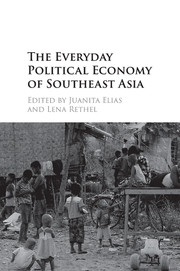Book contents
- Frontmatter
- Epigraph
- Contents
- List of Figures and Map
- List of Tables
- Notes on Contributors
- Acknowledgements
- Part I Introduction
- Part II From Development to Multiple Modernities
- Part III Widening and Deepening Markets
- Part IV People, Mobilities and Work
- Part V Conclusion
- 12 Everyday International Political Economy Meets the Everyday Political Economy of Southeast Asia
- Index
- References
12 - Everyday International Political Economy Meets the Everyday Political Economy of Southeast Asia
from Part V - Conclusion
Published online by Cambridge University Press: 05 August 2016
- Frontmatter
- Epigraph
- Contents
- List of Figures and Map
- List of Tables
- Notes on Contributors
- Acknowledgements
- Part I Introduction
- Part II From Development to Multiple Modernities
- Part III Widening and Deepening Markets
- Part IV People, Mobilities and Work
- Part V Conclusion
- 12 Everyday International Political Economy Meets the Everyday Political Economy of Southeast Asia
- Index
- References
Summary
At its core, this volume has focused on everyday practices of economic engagement that have transformed – and are being transformed by – the Southeast Asian region's embrace of market-led developmentalism. To this end, the chapters in this volume have sought to illustrate the many and varied ways in which everyday actors and their practices of everyday life both constitute and operate within Southeast Asian political economies. Our contributors have considered the production of Southeast Asia's Everyday Political Economy (EPE) within distinct country contexts, drawing together different disciplinary perspectives and engaging a range of methodological and theoretical tools. Concluding a volume of this nature is no easy task. In this endeavour, the editors Elias and Rethel have been joined by John Hobson and Leonard Seabrooke, the authors of the influential 2007 book Everyday Politics of the World Economy, which, in setting out their Everyday International Political Economy (EIPE) approach, provided an important intellectual precursor to this volume. We use this as an opportunity to reflect about how this book project has sought to push the notion of everyday political economy in some quite distinctive directions to that originally put forward by Hobson and Seabrooke. Thus, in these concluding comments, we highlight the points of commonality and differences between the EIPE and EPE projects.
The argument in this chapter unfolds in two steps. We first sketch IPE's journey from a focus on what Hobson and Seabrooke (2007b) called ‘regulatory’ IPE (or RIPE) to a greater concern with the everyday. We then consider the chapters of this book against this background. One final point of note here is that the starting point of analysis of this book is distinct to that advanced in Hobson and Seabrooke's volume. There the authors were centrally interested in the relationship between everyday actor agency and its effect on the global political economy. The current book, however, tends to focus more on developments within particular national economies situated in the Southeast Asian region. This is not to say that the global political economy is ignored; but to the extent that it is discussed, it is mainly in the context of how international influences and pressures are negotiated, mediated and, in some cases, significantly transformed at the national/local level and the role that everyday actors (can) play in acquiescing, contesting or resisting them.
- Type
- Chapter
- Information
- The Everyday Political Economy of Southeast Asia , pp. 239 - 260Publisher: Cambridge University PressPrint publication year: 2016
References
- 1
- Cited by

